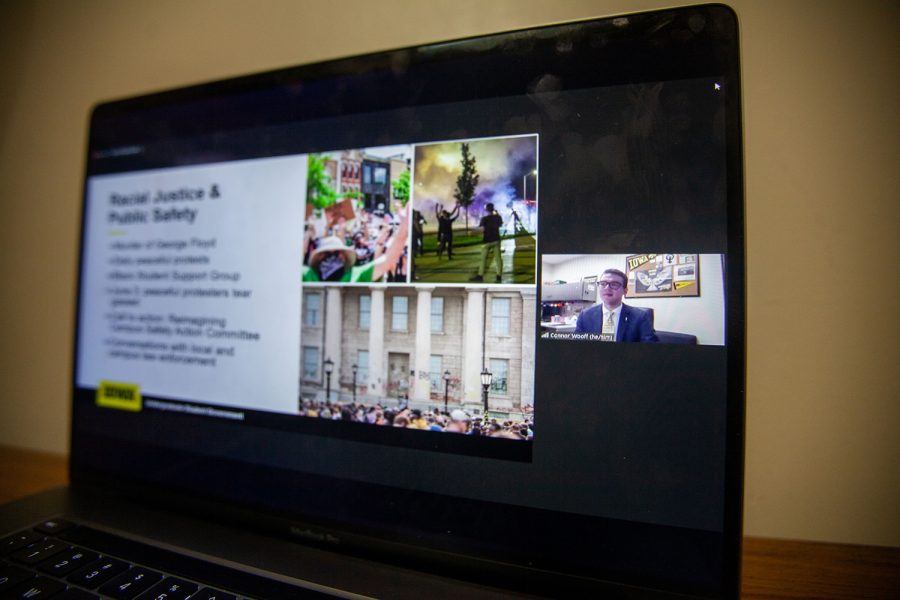2020 brought social justice attention, mental health challenges to Iowa campuses, student leaders say
Students from Iowa’s public institutions spoke to the state Board of Regents at its Tuesday committee meetings, focusing on the areas in which students continue to need support after the complicated and difficult year of 2020
University of Iowa Student Government President, Connor Wooff, speaks during an Iowa Board of Regents meeting on Wednesday, April 7. Wooff talked about the challenges students faced during the pandemic. (Ayrton Breckenridge/The Daily Iowan)
April 7, 2021
A year after COVID-19 drastically changed the lives of college students, student leaders at Iowa’s public universities say students have confronted struggles for racial justice and mental health issues over the academic year.
At a state Board of Regents meeting on Wednesday, outgoing University of Iowa Undergraduate Student Government President Connor Wooff was among student reps from four regents institutions that told the regents of the unprecedented student experiences this year.
Wooff said in Iowa City, those challenges ranged from the pandemic to the consistent call for racial justice throughout the Iowa City community.
“Racial justice and public safety has probably been the largest issue [on campus], beginning this summer with the murder of George Floyd,” he said. “As we saw across the country, the Black Lives Matter movement engaged millions of Americans and thousands here in Iowa City. We saw engagement from our student body on a public issue more than we have in generation probably since the Vietnam War.”
Following these protests, Wooff said USG focused on creating tangible change towards diversity, equity, inclusion, both including racial justice and public safety.
The impact these protests had on the Iowa City and UI community led to the development of the Reimaging Campus Safety Action Committee, he said. The Reimagining Campus Safety Action Committee was formed in June and is charged with developing a different, more holistic approach to campus emergencies.
Wooff complimented the committee and said members of the committee are doing an incredible job when reevaluating what campus needs when it comes to safety.
The UI was not alone in ensuring students were a part of discussions about social justice on campus. Morgan Fritz, the former president of ISU’s Student Government, said the student government hosted social justice forums and diversity roundtables.
“[Diversity, equity, and inclusion] was definitely at the forefront of students’ minds and wanting to know that they were being heard and listened to,” she said. “We are doing what we can to ensure campus is inclusive for everybody.”
Students are learning differently because the majority of instruction at the UI has been administered online, Wooff said. More than 70 percent of undergraduate course hours have been taught online for the academic year. Alongside classes, he said the majority of student engagement has moved online as well. Under current guidelines, the UI imposes a limit of 50 people on the number of people that could gather indoors for events in university-owned spaces.
Wooff said his administration pushed for initiatives to ensure students continue to receive the support they need to be successful in the virtual classroom and outside of it.
“Learning in this pandemic has been different than any class or any group of college students in U.S. history,” he said. “Our students have come this school year learning in a global pandemic. In doing so, they experienced Zoom fatigue…many have had a challenge with communication with faculty, as it’s a lot different.”
The changes of learning in a home environment has been stressful and challenging to students, Wooff said, and options like extended drop dates and pass fail options to students have helped.
Kalista Nipper, a 10th-grade student at the Iowa School for the Deaf, signed to the regents and told them she felt connected at the school and the pandemic impacted her severely.
“All of the students having to be in their home locations away from the campus, we felt very isolated,” Nipper said through an interpreter. “ISD, for me, is my second home, so it was horrible to experience that isolation.”
She told the regents when the students came back to school, the distance still exists and students are missing connections.
UNI Student Body President Elle Boeding said UNI is focusing on mental health support as the campus moves forward through the end of the COVID-19 pandemic. UNI’s student government wants to focus on making sure resources are accessible to their students, she said.
“It’s really important that we give [students] the support that they need to be healthy and successful,” she said. “…Now more than ever, mental health is at the forefront of all of our conversations in higher education.”
Fritz said it was integral to ISU’s student government to ensure students returned to campus safely and accommodations were made for them.
“We were able to voice the student perspective and students were represented in the area [of how to return to campus], and I think it was largely a success,” she said. “We were able to be back on campus and students were really happy about that.”
ISU student government also focused on accessibility of buildings alongside focusing on ways to ensure students were supported during the COVID-19 pandemic, Fritz said.
Looking ahead, Wooff said students will continue to play an integral part of the UI’s presidential search. He said USG is also looking to increase the Student Activity Fee by $1 each semester.
The funds of this $1 increase will go to funding the UI’s student services that support student organizations and Student Legal Services, he said.
Wooff added that USG and the UI are looking to prioritize current first-year and future incoming students and their transition back to a more normal facilitation of education in the fall.
“As we look to returning to normal next year…one [important thing] is engaging our first-year students and our incoming students’ since their transitions have been unlike any before, both coming out of high school and going into college,” he said.



